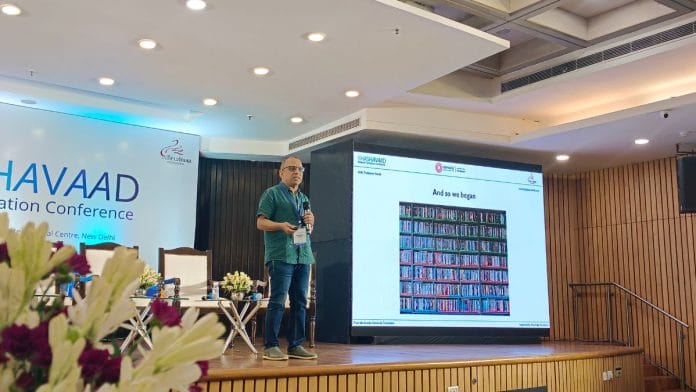New Delhi: After nearly two years of hard work and research, the Ashoka Centre for Translation, in collaboration with the New India Foundation, has created a database search engine that can answer almost every question related to translation, translated works, and translators.
“It began with the idea that translation exists primarily in the form of books, but no one knows how many of these books exist, what has been translated, or who translated them. At any given time, there are more questions than answers”, explained Arunava Sinha, co-director of Ashoka Centre for Translation, at the launch event for the search engine.
The search engine has access to a comprehensive database of translations. It was launched at the first ‘Bhashavaad: National Translation Conference’ at the India International Centre, New Delhi. The event underscored the need and importance of translating between Indian languages.
A work-in-progress project
The database consists of over 14,000 entries of books, encompassing works translated into English and Indian languages. The team plans to expand it to approximately 25,000 entries in the future. It also includes information on 6,500 authors and 7,000 translators.
“We have collected barely 15 to 20 per cent of the kind of information that we can get about translated books,” said Sinha. He added that it is a work-in-progress project because the information itself keeps growing as they collect it.
The search engine, indiatranslationsearch.com, offers users the ability to explore a vast database in numerous ways. For example, if one searches for the author Premchand, it will provide a list of all the translations of his works with the names of translators and other details such as the publication date.
“Users can filter results by language or translator, which offers an interactive and intuitive way to navigate the database,” said Sinha while showing some slideshow examples.
Also read: Delhi book event asks to revisit ancient texts—goddesses have been sanitised by modern ideals
A vital tool for translators, researchers
During the slideshow, Sinha talked about the difficulties his team faced during database development.
“It draws from publisher catalogues, library collections, and direct inquiries with individuals and institutions, revealing a treasure trove of previously unstructured information. It was a long-term process with a big team to collect all this information,” he added. The research has unearthed a surprising amount of data: Out of the 14,000 entries, 5,000 are translations into English and all the rest are translations into Indian languages.

The event also delved into some interesting insights derived from the data. It was noted that while English remains the most common target language for translations, there is significant interaction between the Indian languages. For example, Bengali and Hindi are the most translated languages, with a substantial number of works also translated into Tamil, Malayalam, and Kannada.
The search engine will help a lot of people, stressed Sinha. “It will become a vital tool for researchers, translators, and literary enthusiasts with its vast information.”
The goal of his project is to facilitate access to information and stimulate further research into translation practices and trends. It has limitless potential.
“This project is a collaboration that will benefit from the input and engagement of people around the country and beyond.”
(Edited by Prasanna Bachchhav)






